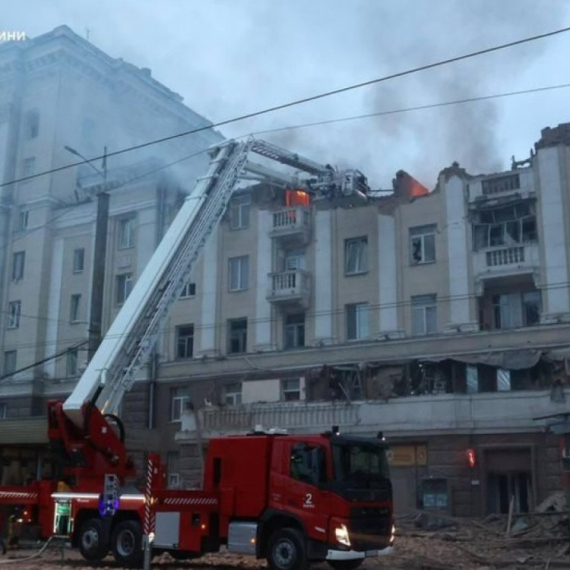Why Serbia Needs IMF?
It is unclear what the programme of the new government is, although it has been emphasized that one of the objectives is the reduction of the unemployment rate.
Thursday, 15.08.2013.
11:22

It is unclear what the programme of the new government is, although it has been emphasized that one of the objectives is the reduction of the unemployment rate. It is unclear how the objective of the new government that the unemployment rate be reduced to below 20% in 2014 is going to be achieved. Why Serbia Needs IMF? The need to ease the burden of the public debt is also mentioned, because the interest rates to the withdrawn loans are very high. It is also unclear what they exactly have in mind. A possibility is that these are indications that the government will open the talks with the International Monetary Fund (IMF) with the goal to ease the burden of foreign and public debts, Vladimir Gligovor wrote, Pescanik website posted. How could it look like? First of all, how big the problems are? Foreign debt, i.e. the overall debt of all – from the state and companies to the households – in hard currency, or at least the ones taken from foreign creditors, is more than 100% of the GDP. It increases every year due to the fact that there is deficit in foreign trade - which is shown as a deficit in current account of the balance of payments - around up to 10% of the GDP over the past couple of years, although it will be lower this year, highly likely around 7-8%. That is around EUR two billion. All of that is not financed by debt accumulation only, but partially through foreign investments - no matter if these are obtained through the sale of property, or the new jobs - but, that way obligations towards the new owners are created in the form of yield on capital, and categorically speaking these obligations are no different than debts. Is it sustainable? Deficit in the current account has been dropping over the past couple of years, primarily because the import growth has been significantly slowed down. Actually, the import of goods this year will still be almost EUR 1 billion lower than in 2008. On the other hand, exports of goods will be almost EUR 2 billion higher than in 2008. Exports of services will also be significantly higher whereas the imports will be approximately the same like in 2008. August 15, 2013 So, the foreign trade deficit has been reduced, which means that the overall deficit in the foreign trade has been reduced as well. However, this is the result of the decrease in domestic demand, that is spending of the households and the state as well as of decrease in investments of the companies. Since the overall production, the GDP, is not bigger than the one in 2008, it means that the reorientation to the foreign markets occurred, because there are no buyers at home. Indeed, that increase in exports and reduction in imports is the thing that maintains the current level of production and the growth of it. But, if the economic growth is not going to be accelerated - with the current deficit in the foreign trade, i.e. with the current increase in the foreign debt - it will be unsustainable. The latest data on the economic growth are not encouraging, because it was just a little bit over 1% in the first six months this year compared with the same period last year; and the chances are that the investments will still have negative growth rate (like in Q1 this year), although the data are missing. One should have in mind that the projections for 2013 and the following years, which were made as a basis of fiscal strategy, envisaged significant growth of the very investments, not their further decrease. What does it mean? There is experience, the one from 1982 for example (Socialist Federal Republic of Yugoslavia practically went bankrupt then). Basically, if the debts cannot be serviced on the regular basis, a sort of exchange should take place - the imports are equal to the exports (with some extra possibilities that are result of transfers, mostly remittances). Problem with that is that the possibilities of foreign investments are limited that way - because they increase imports (foreign money that enters the country should be spent in either exports, or be reinvested abroad, for example through increase in foreign currency reserves). That way not only the exports is limited, but accessibility to foreign investments as well. These are circumstances when a country needs the IMF, because the country can borrow money from it in order to keep on trading and investing, with the change of the economic policy in order to provide sustainability of the financial relations with foreign countries. (…) It is necessary to turn the debts into foreign investments through creating new jobs and investments in existing, or even better in new companies. It requires structural reforms and new economic policy. That could be the contents that the IMF might back in a new agreement. But, among the first items in that agreement certainly will be the public spending, because the public debt is high as well as the fiscal deficit, Gligorov wrote. /Tanjug, file/ VIP
Why Serbia Needs IMF?
The need to ease the burden ofthe public debt is also mentioned, because the interest rates to the
withdrawn loans are very high. It is also unclear what they exactly
have in mind. A possibility is that these are indications that the
government will open the talks with the International Monetary Fund
(IMF) with the goal to ease the burden of foreign and public debts,
Vladimir Gligovor wrote, Pescanik website posted.
How could it look like?
First of all, how big the problems are? Foreign debt, i.e. the
overall debt of all – from the state and companies to the households –
in hard currency, or at least the ones taken from foreign creditors, is
more than 100% of the GDP. It increases every year due to the fact
that there is deficit in foreign trade - which is shown as a deficit in
current account of the balance of payments - around up to 10% of the
GDP over the past couple of years, although it will be lower this year,
highly likely around 7-8%. That is around EUR two billion.
All of that is not financed by debt accumulation only, but
partially through foreign investments - no matter if these are obtained
through the sale of property, or the new jobs - but, that way
obligations towards the new owners are created in the form of yield
on capital, and categorically speaking these obligations are no
different than debts.
Is it sustainable?
Deficit in the current account has been dropping over the
past couple of years, primarily because the import growth has been
significantly slowed down. Actually, the import of goods this year
will still be almost EUR 1 billion lower than in 2008. On the other
hand, exports of goods will be almost EUR 2 billion higher than in
2008. Exports of services will also be significantly higher whereas the
imports will be approximately the same like in 2008.
August 15, 2013
So, the foreign trade deficit has been reduced, which means
that the overall deficit in the foreign trade has been reduced as well.
However, this is the result of the decrease in domestic demand, that is
spending of the households and the state as well as of decrease in
investments of the companies.
Since the overall production, the GDP, is not bigger than
the one in 2008, it means that the reorientation to the foreign markets
occurred, because there are no buyers at home. Indeed, that increase
in exports and reduction in imports is the thing that maintains the
current level of production and the growth of it.
But, if the economic growth is not going to be accelerated -
with the current deficit in the foreign trade, i.e. with the current
increase in the foreign debt - it will be unsustainable.
The latest data on the economic growth are not
encouraging, because it was just a little bit over 1% in the first six
months this year compared with the same period last year; and the
chances are that the investments will still have negative growth rate
(like in Q1 this year), although the data are missing. One should have
in mind that the projections for 2013 and the following years, which
were made as a basis of fiscal strategy, envisaged significant growth
of the very investments, not their further decrease.
What does it mean? There is experience, the one from 1982
for example (Socialist Federal Republic of Yugoslavia practically
went bankrupt then). Basically, if the debts cannot be serviced on the
regular basis, a sort of exchange should take place - the imports are
equal to the exports (with some extra possibilities that are result of
transfers, mostly remittances).
Problem with that is that the possibilities of foreign
investments are limited that way - because they increase imports
(foreign money that enters the country should be spent in either
exports, or be reinvested abroad, for example through increase in
foreign currency reserves).
That way not only the exports is limited, but accessibility to
foreign investments as well. These are circumstances when a country
needs the IMF, because the country can borrow money from it in
order to keep on trading and investing, with the change of the
economic policy in order to provide sustainability of the financial
relations with foreign countries.
(…) It is necessary to turn the debts into foreign
investments through creating new jobs and investments in existing, or even
better in new companies. It requires structural reforms and new
economic policy.
That could be the contents that the IMF might back in a
new agreement. But, among the first items in that agreement certainly
will be the public spending, because the public debt is high as well as
the fiscal deficit, Gligorov wrote.

























Komentari 1
Pogledaj komentare